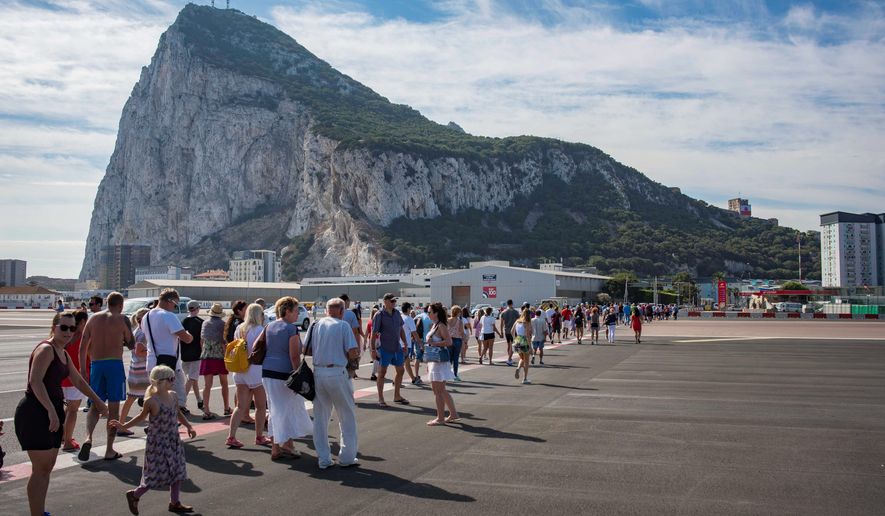GIBRALTAR — Residents of Gibraltar have been battening down the hatches as prospects loom that their little corner of Britain may be facing a tough border with Spain if the United Kingdom crashes out of the European Union without a deal for future relations.
The tremors rattling the fabled Rock of Gibraltar are just one more sign of the stakes involved as Prime Minister Theresa May faces a make-or-break decision Tuesday in Parliament on her little-loved Brexit plan.
Mrs. May, the leader of the Conservative Party, on Monday offered further protections for workers and a reassuring letter from EU leaders as she implored British lawmakers to support her floundering deal. But there were few signs she had changed enough minds to avoid a humiliating rejection that would throw Britain into disarray just weeks before the U.K. is due to leave the bloc on March 29.
Dominic Grieve, a Conservative member of Parliament who is trying to broker a last-minute deal among Britain’s warring political factions, compared a departure from the EU without an agreed-upon plan to “national suicide.”
“The economic damage which it will do to us will be immense so that the most vulnerable in our society will be those who suffer most as a consequence,” Mr. Grieve told reporters.
A no-deal Brexit has sparked speculation on what might happen, including a sharp slowdown in trade, a steep drop in the pound, and disruptions along the land border between Northern Ireland and the Republic of Ireland, an EU member.
Then there’s the Gibraltar problem.
The British rock colony jutting out from Spain’s southern tip could be left in a precarious position if Parliament rejects Mrs. May’s deal, which includes provisions intended to protect Gibraltar from Spanish pressures. Madrid has never accepted Britain’s claims to sovereignty of the strategically located outcropping at the entrance to the Mediterranean.
The concerns have grown so alarming that top Gibraltar officials, including Chief Minister Fabian Picardo and Deputy Chief Minister Joseph Garcia, traveled to London last week for talks with the Foreign and Commonwealth Office about preparations should Mrs. May’s plan be rejected and a no-deal Brexit comes to pass.
If the U.K. “crashes out” of the EU through a “hard” Brexit, then Gibraltar’s economy and lifestyle could suffer seriously, local officials warn.
“Gibraltar has been making plans for a ’no deal’ scenario,” a Gibraltar government spokesman said. Residents have been advised to renew British passports if they expire within six months, obtain special international driver’s licenses being issued locally for the first time and purchase travel insurance because British National Health Service benefits will no longer cover them across the border.
Options for Madrid
Spanish authorities insist that there are no plans to close the border along the narrow isthmus connecting Spain’s mainland with the Rock. But reasserting historical claims over the strategic territory lost in an 18th-century war remains central to Spanish policy.
Spanish Prime Minister Pedro Sanchez recently threatened to veto EU approval of Mrs. May’s Brexit agreement unless it specifically recognized Spain’s authority in any future negotiations over Gibraltar.
Spain’s navy seemed to be testing the waters with aggressive patrolling around the Rock by an armed corvette blaring the Spanish national anthem over loudspeakers in two separate incidents over the past month.
In another incident, a British warship fired salvos at Spanish vessels shadowing the entry of British nuclear submarines into Gibraltar’s naval base.
Few believe the tensions could ever escalate into a war between Britain and Spain, which are NATO allies. But international legal analysts say border barriers could go up automatically without a special deal from Spain. The leap into the unknown could take both sides to places and positions neither expected.
“Don’t know how I can get my passport stamped every time I cross that border. I would soon run out of pages,” said a Gibraltar lawyer who commutes regularly between the Gibraltar enclave and his Spanish home.
Gibraltarian taxi drivers and shopkeepers fear tougher Spanish controls could snarl border traffic and discourage tourism, as has occurred during past disputes over alleged money laundering and tobacco smuggling.
The British residents of Gibraltar would not be the only ones inconvenienced.
Spain’s surrounding region of Andalusia could be hit equally hard. Over 13,000 Spanish workers cross the border every day from towns such as La Linea, which already suffer from high unemployment, crime and mounting drug violence.
“In a way, Brexit is good for us because it’s made us develop more direct understandings with local Spanish authorities and political institutions that recognize that they have as much to lose as we have,” said Brian Reyes, editor of the Gibraltar Chronicle.
The Gibraltar government has held a series of direct meetings with heads of the Andalusia regional government, as well as leaders of the main Spanish political parties to brace for whatever Brexit plan emerges.
Fears of restricted access to the EU market are also making some 50,000 companies in Gibraltar, including financial services, insurance firms and online gambling operations, increasingly jittery. Some are making “contingency plans” to move elsewhere, according to a local casino executive.
But it works both ways. A car insurance company in the former British colony of Malta has announced plans to move to Gibraltar to ensure it retains access to the British market in the post-Brexit world.
⦁ This article is based in part on wire service reports.




Please read our comment policy before commenting.